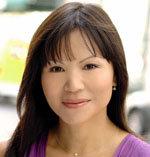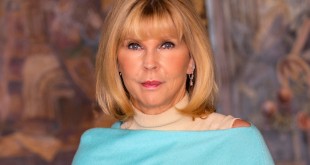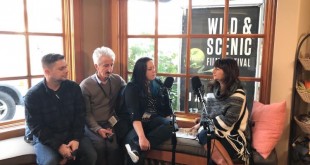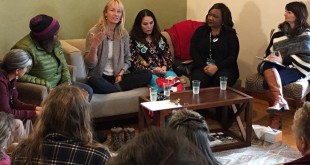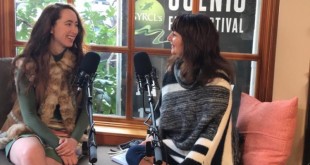With no formal training in filmmaking Lee learned quickly by doing and her debut feature film, Falling for Grace, premiered at the 2006 Tribeca Film Festival. She has since traveled across the US and Canada to promote the film, including a special screening last year at the Nevada Theatre in Nevada City presented by CATS. In her film and other creative endeavors, Lee is working hard to break the “celluloid ceiling” in Hollywood so women’s voices and stories are heard.
How did you get into filmmaking?
“I was an actor first. Right out of college I had some luck and was cast in Miss Saigon on Broadway. I performed in theatre groups around the county, but when I returned to New York to settle down, I found there were very few opportunities for Asian Americans actors. I didn’t become an actress to take on a series of supporting roles, so I wrote a screenplay. I went to a writing class, developed a screenplay and entered it in competitions. After I started winning these competitions, I began getting calls from certain producers, some big and small. A year later nothing had happened, so I started raising the money myself.”
What was story that you set out to tell in the film?
“To accept oneself for the way you are; it’s about self-esteem. I wanted Grace to go on this journey and ultimately realize that she is good enough and that in order to validate herself, she realizes the most important person is herself.”
Why is it important for women to get involved in filmmaking?
“If you look at the numbers of women in Hollywood it’s horrible. In 2009 women directed only 7% of films, the same number as twenty-years ago. There has been no movement. This affects everyone, including how women see themselves, how man see women, how children and the next generation see themselves. No wonder there are so many women suffering from eating disorders because 93% of the time we see an image of a woman it is from a man’s perspective.”
How do you stay positive in light of such dismal numbers?
“Sometimes I wake up and ask what am I doing? I’m literally swimming upstream everyday. I could give up or keep fighting. For me there is no choice, I have to make a second film. I’m an American and I want to write and make films for people like me.”
You screened this film all across the US in small towns just like those in Nevada County. What did you want to share with these audiences?
“I wanted to introduce an Asian American family to other Americans and have them understand that we are not that different; we are all immigrants. When you read a book you don’t see or get a feel for the characters. When you see them on screen you really get who they are. The more you are exposed to different faces, the more familiar they are and the less afraid and more open you become. The media, both print and film, are so powerful in terms of making this country aware of the people who are out there.”
What would be your message to women around the world?
“That they have to absolutely love and believe in themselves. To go for what ever it is they want, everyone has a different dream and it is never too late to start. If I can do it, anyone can. I’m not extraordinarily talented, but I’m a hard worker and passionate about what I’m doing.”
See Jane Do is a multimedia program capturing the stories of everyday women doing extraordinary things for the planet. Catch our one-hour talk radio program on KVMR 89.5FM the first Wednesday of every month from 1-2 p.m.
Get involved !
5 things you can do today to support the need for women’s voices in film.
- Sign the Women’s Media Center petition at http://bit.ly/oscarwmc to ensure a longer list of women at next year’s Oscars.
- Write the presidents of Sony, Dreamworks, Disney, or Warner Brothers and tell them that you want to see more films made by women and/or starring women of all ethnicities.
- Ask your local movie theatre or video rental store to carry a wider selection of films, including those made by women.
- Screen films in your home or start your own film society, and have a discussion group afterwards.
- Make a film, write a script that features real women, or help a woman fund her film.
 See Jane Do Everyday Women Doing Extraordinary Things
See Jane Do Everyday Women Doing Extraordinary Things
